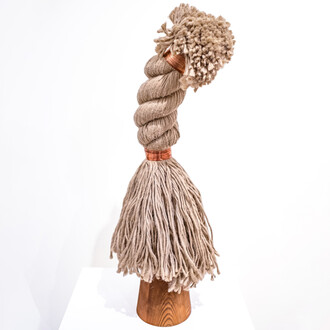Marlborough Contemporary is pleased to announce ‘Origins’, an exhibition of new works by Jason Brooks. The series consists of seven apparently abstract paintings that reveal the unexpectedly tactile experience of viewing paint. The works, each identical in size and orientation, differ in their individual spectrums of strong, sometimes garish, colours that swirl, overlap and accumulate in the creation of a new visceral style, a constellation of marks that attempts to escape the constraints of an art historical inheritance. Paint drips onto the exposed sides of the canvases, to make transparent the process of rendering faultless illusion, exhibiting what Michael Bracewell has called ‘the object residue of an addiction to process, in which process conflates desire, satiation, surface, tension, release and texture.’
This attempt to escape complicity with historical tradition betrays a complicated relationship with the canon. Brooks refers to Courbet’s ‘The Origin of the World’ (1866) in the making of this series, putting into practice the desire to repaint and rework canonical pieces that is a consistent theme in his works. Brooks also seeks to escape a linear relationship with this history by yielding up control of his source material in order that the works not present one single perspective, but bring others’ subjective desires of form and colour into his field of vision.
Brooks’ collaborators provide source material, working with paint in colour and form which are completely outside of the artist’s control. The ‘sitter’ is no longer passively observed, but their body becomes their own canvas, to be repainted and reinterpreted in turn by the artist. As with the work by Courbet, the field of vision is cropped so that identifying features of each model are not the focal points of the paintings. Brooks then meticulously recreates their blind abstractions in what he has described as the ‘closest he has come to a discussion with abstract art.’ Indeed, the paintings are not abstract at all, as they are complex reworkings of the abstract forms offered to him; realist paintings of abstract sources.
The works invite the viewer to ask whether knowledge of a work’s origin should ever change its meaning and whether a purely aesthetic relationship with the form of art is possible. A central paradox in Brooks’ works – the love of painting and our desire for the materiality of paint - is denied meaning by a technique that itself questions whether process should ever be allowed to become the subject of the painting itself. The paintings open up a dialogue about how illusion in painting is formed and how we as viewers engage with that illusion.
The exhibition will also be accompanied by a series of prints, which will be on display at Marlborough Graphics. Each of the prints will be hand finished by the artist, meaning that, like the works in the exhibition, they have identical origins but divergent stories.
A monograph written by Michael Bracewell, exploring the past twenty years of Brooks’ work, will be published to coincide with the exhibition.



















